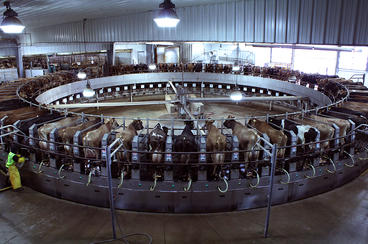
The University of Minnesota’s College of Veterinary Medicine and Davis Family have joined forces to create a unique partnership between a public university and a private dairy. The result is an academic facility and program of education and research that is merged into a commercial dairy committed to producing high-quality milk, economic success, environmental stewardship and outstanding animal welfare.
The Center is located northwest of Saint Peter in New Sweden Township in Nicollet County. The academic building is built into the dairy itself, incorporating classrooms, research and teaching labs, offices, and dormitory space into the same building that houses the dairy’s management offices and under the same roof as the whole dairy.
Mission
- To educate veterinary students in the care and management of dairy cows
- To educate practicing veterinarians and other professionals serving the dairy industry
- To serve as a site for applied research and development
- To demonstrate excellent animal care, environmental protection, sustainability and efficient and high-quality food production
Education
In addition to a busy schedule of clinical rotations for senior veterinary students, the Center also hosts a variety of continuing education programs for other dairy professionals and producers. The Center has three classrooms that can be configured for a variety of education settings. The two upstairs classrooms overlook the rotary parlor and the calving pens. Teaching labs are also used to enhance the student’s learning. The facility offers opportunities to practice hands-on skills such as artificial insemination, obstetrics, feed evaluation, foot trimming, mastitis care and other practical skills. Learning can begin in the classroom, move to laboratory sessions and then apply what is learned on the actual dairy. Courses can be tailored to the audience, moving from beginning students to advanced courses for experienced dairy professionals.
Research
A research lab in the John Fetrow Dairy Education Center supports faculty investigations and is a work space for research sample processing. The access to a large population of cows makes it possible to study many different naturally occurring diseases and to develop management systems to improve cow care, welfare, and productivity.